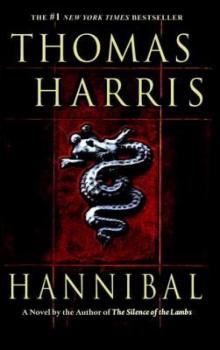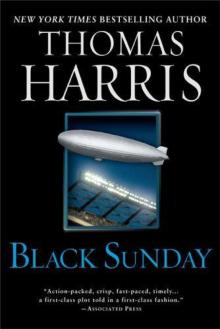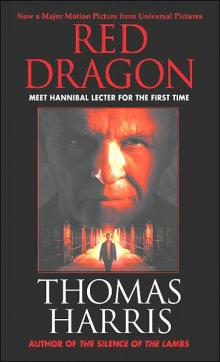- Home
- Thomas Harris
Hannibal Page 5
Hannibal Read online
Page 5
“It’s under seal in the property room at Quantico.”
Assistant Director Noonan’s own beeper went off. He frowned at the number and excused himself from the room. In a moment, he summoned Pearsall to join him outside.
Wainwright, Eldredge and Holcomb looked out the window at Fort McNair, hands in their pockets. They might have been waiting in an intensive care unit. Paul Krendler caught Sneed’s eye and urged him toward Starling.
Sneed put his hand on the back of Starling’s chair and leaned over her. “If your testimony at a hearing is that, while you were on TDY assignment from the FBI, your weapon killed Evelda Drumgo, BATF is prepared to sign off on a statement that Brigham asked you to pay … special attention to Evelda in order to take her into custody peacefully. Your weapon killed her, that’s where your service has to carry the can. There will be no interagency pissing contest over rules of engagement and we won’t have to bring in any inflammatory or hostile statements you made in the van about what sort of person she was.”
Starling saw Evelda Drumgo for an instant, coming out of the doorway, coming out of the car, saw the carriage of her head and, despite the foolishness and waste of Evelda’s life, saw her decision to take her child and front her tormenters and not run from it.
Starling leaned close to the microphone on Sneed’s tie and said clearly, “I’m perfectly happy to acknowledge the sort of person she was, Mr. Sneed: She was better than you.”
Pearsall came back into the office without Noonan and closed the door. “Assistant Director Noonan has gone back to his office. Gentlemen, I’m going to call a halt to this meeting, and I’ll get back to you individually by telephone,” Pearsall said.
Krendler’s head came up. He was suddenly alert at the scent of politics.
“We’ve got to decide some things,” Sneed began.
“No, we don’t.”
“But—”
“Bob, believe me, we don’t have to decide anything. I’ll get back to you. And, Bob?”
“Yeah?”
Pearsall grabbed the wire behind Sneed’s tie and pulled down hard, popping buttons off Sneed’s shirt and snatching tape loose from his skin. “You come to me with a wire again and I’ll put my foot in your ass.”
None of them looked at Starling as they left, except Krendler.
Moving toward the door, sliding his feet so he would not have to look where he was going, he used the extreme articulation of his long neck to turn his face to her, as a hyena would shuffle at the fringe of a herd, peering in at a candidate. Mixed hungers crossed his face; it was Krendler’s nature to both appreciate Starling’s leg and look for the hamstring.
CHAPTER
8
BEHAVIORAL SCIENCE is the FBI section that deals with serial murder. Down in its basement offices, the air is cool and still. Decorators with their color wheels have tried in recent years to brighten the subterranean space. The result is no more successful than funeral home cosmetics.
The section chief’s office remains in the original brown and tan with the checked café curtains on its high windows. There, surrounded by his hellish files, Jack Crawford sat writing at his desk.
A knock, and Crawford looked up to a sight that pleased him—Clarice Starling stood in his doorway.
Crawford smiled and rose from his chair. He and Starling often talked while standing; it was one of the tacit formalities they had come to impose on their relationship. They did not need to shake hands.
“I heard you came to the hospital,” Starling said. “Sorry I missed you.”
“I was just glad they let you go so fast,” he said. “Tell me about your ear, is it okay?”
“It’s fine if you like cauliflower. They tell me it’ll go down, most of it.” Her ear was covered by her hair. She did not offer to show him.
A little silence.
“They had me taking the fall for the raid, Mr. Crawford. For Evelda Drumgo’s death, all of it. They were like hyenas and then suddenly it stopped and they slunk away. Something drove them off.”
“Maybe you have an angel, Starling.”
“Maybe I do. What did it cost you, Mr. Crawford?”
Crawford shook his head. “Close the door, please, Starling.” Crawford found a wadded Kleenex in his pocket and polished his spectacles. “I would have done it if I could. I didn’t have the juice by myself. If Senator Martin was still in office, you’d have had some cover…. They wasted John Brigham on that raid—just threw him away. It would have been a shame if they wasted you like they wasted John. It felt like I was stacking you and John across a Jeep.”
Crawford’s cheeks colored and she remembered his face in the sharp wind above John Brigham’s grave. Crawford had never talked to her about his war.
“You did something, Mr. Crawford.”
He nodded. “I did something. I don’t know how glad you’ll be. It’s a job.”
A job. Job was a good word in their private lexicon. It meant a specific and immediate task and it cleared the air. They never spoke if they could help it about the troubled central bureaucracy of the Federal Bureau of Investigation. Crawford and Starling were like medical missionaries, with little patience for theology, each concentrating hard on the one baby before them, knowing and not saying that God wouldn’t do a goddamned thing to help. That for fifty thousand Ibo infant lives, He would not bother to send rain.
“Indirectly, Starling, your benefactor is your recent correspondent.”
“Dr. Lecter.” She had long noted Crawford’s distaste for the spoken name.
“Yes, the very same. For all this time he’d eluded us— he was away clean—and he writes you a letter. Why?”
It had been seven years since Dr. Hannibal Lecter, known murderer of ten, escaped from custody in Memphis, taking five more lives in the process.
It was as though Lecter had dropped off the earth. The case remained open at the FBI and would remain open forever, or until he was caught. The same was true in Tennessee and other jurisdictions, but there was no task force assigned to pursue him anymore, though relatives of his victims had wept angry tears before the Tennessee state legislature and demanded action.
Whole tomes of scholarly conjecture on his mentality were available, most of it authored by psychologists who had never been exposed to the doctor in person. A few works appeared by psychiatrists he had skewered in the professional journals, who apparently felt that it was safe to come out now. Some of them said his aberrations would inevitably drive him to suicide and that it was likely he was already dead.
In cyberspace at least, interest in Dr. Lecter remained very much alive. The damp floor of the Internet sprouted Lecter theories like toadstools and sightings of the doctor rivaled those of Elvis in number. Impostors plagued the chat rooms and in the phosphorescent swamp of the Web’s dark side, police photographs of his outrages were bootlegged to collectors of hideous arcana. They were second in popularity only to the execution of Fou-Tchou-Li.
One trace of the doctor after seven years—his letter to Clarice Starling when she was being crucified by the tabloids.
The letter bore no fingerprints, but the FBI felt reasonably sure it was genuine. Clarice Starling was certain of it.
“Why did he do it, Starling?” Crawford seemed almost angry at her. “I’ve never pretended to understand him any more than these psychiatric jackasses do. You tell me.”
“He thought what happened to me would … destroy, would disillusion me about the Bureau, and he enjoys seeing the destruction of faith, it’s his favorite thing. It’s like the church collapses he used to collect. The pile of rubble in Italy when the church collapsed on all the grandmothers at that special Mass and somebody stuck a Christmas tree in the top of the pile, he loved that. I amuse him, he toys with me. When I was interviewing him he liked to point out holes in my education, he thinks I’m pretty naïve.”
Crawford spoke from his own age and isolation when he said, “Have you ever thought that he might like you, Starling?”
“I think I
amuse him. Things either amuse him or they don’t. If they don’t …”
“Ever felt that he liked you?” Crawford insisted on the distinction between thought and feeling like a Baptist insists on total immersion.
“On really short acquaintance he told me some things about myself that were true. I think it’s easy to mistake understanding for empathy—we want empathy so badly. Maybe learning to make that distinction is part of growing up. It’s hard and ugly to know somebody can understand you without even liking you. When you see understanding just used as a predator’s tool, that’s the worst. I … I have no idea how Dr. Lecter feels about me.”
“What sort of things did he tell you, if you don’t mind.”
“He said I was an ambitious, hustling little rube and my eyes shined like cheap birthstones. He told me I wore cheap shoes, but I had some taste, a little taste.”
“That struck you as true?”
“Yep. Maybe it still is. I’ve improved my shoes.”
“Do you think, Starling, he might have been interested to see if you’d rat him out when he sent you a letter of encouragement?”
“He knew I’d rat him out, he’d better know it.”
“He killed six after the court committed him,” Crawford said. “He killed Miggs in the asylum for throwing semen in your face, and five in his escape. In the present political climate, if the doctor’s caught he’ll get the needle.” Crawford smiled at the thought. He had pioneered the study of serial murder. Now he was facing mandatory retirement and the monster who had tried him the most remained free. The prospect of death for Dr. Lecter pleased him mightily.
Starling knew Crawford mentioned Miggs’s act to goose her attention, to put her back in those terrible days when she was trying to interrogate Hannibal the Cannibal in the dungeon at the Baltimore State Hospital for the Criminally Insane. When Lecter toyed with her while a girl crouched in Jame Gumb’s pit, waiting to die. Usually Crawford heightened your attention when he was coming to the point, as he did now.
“Did you know, Starling, that one of Dr. Lecter’s early victims is still alive?”
“The rich one. The family offered a reward.”
“Yes, Mason Verger. He’s on a respirator in Maryland. His father died this year and left him the meatpacking fortune. Old Verger also left Mason a U.S. congressman and a member of the House Judiciary Oversight Committee who just couldn’t make ends meet without him. Mason says he’s got something that might help us find the doctor. He wants to speak with you.”
“With me.”
“You. That’s what Mason wants and suddenly everyone agrees it’s a really good idea.”
“That’s what Mason wants after you suggested it to him?”
“They were going to throw you away, Starling, clean up with you like you were a rag. You would have been wasted just like John Brigham. Just to save some bureaucrats at BATF. Fear. Pressure. That’s all they understand anymore. I had somebody drop a dime to Mason and tell him how much it would hurt the hunt for Lecter if you got canned. Whatever else happened, who Mason might have called after that, I don’t want to know, probably Representative Vellmore.”
A year ago, Crawford would not have played this way. Starling searched his face for any of the short-timer craziness that sometimes comes over imminent retirees. She didn’t see any, but he did look weary.
“Mason’s not pretty, Starling, and I don’t just mean his face. Find out what he’s got. Bring it here, we’ll work with it. At last.”
Starling knew that for years, ever since she graduated from the FBI Academy, Crawford had tried to get her assigned to Behavioral Science.
Now that she was a veteran of the Bureau, veteran of many lateral assignments, she could see that her early triumph in catching the serial murderer Jame Gumb was part of her undoing in the Bureau. She was a rising star that stuck on the way up. In the process of catching Gumb, she had made at least one powerful enemy and excited the jealousy of a number of her male contemporaries. That, and a certain cross-grainedness, had led to years of jump-out squads, and reactive squads rolling on bank robberies and years of serving warrants, seeing Newark over a shotgun barrel. Finally, deemed too irascible to work with groups, she was a tech agent, bugging the telephones and cars of gangsters and child pornographers, keeping lonesome vigils over Title Three wiretaps. And she was forever on loan, when a sister agency needed a reliable hand in a raid. She had wiry strength and she was fast and careful with the gun.
Crawford saw this as a chance for her. He assumed she had always wanted to chase Lecter. The truth was more complicated than that.
Crawford was studying her now. “You never got that gunpowder out of your cheek.”
Grains of burnt powder from the revolver of the late Jame Gumb marked her cheekbone with a black spot.
“Never had time,” Starling said.
“Do you know what the French call a beauty spot, a mouche like that, high on the cheek? Do you know what it stands for?” Crawford owned a sizeable library on tattoos, body symbology, ritual mutilation.
Starling shook her head.
“They call that one ’courage,’” Crawford said. “You can wear that one. I’d keep it if I were you.”
CHAPTER
9
THERE IS a witchy beauty about Muskrat Farm, the Verger family’s mansion near the Susquehanna River in northern Maryland. The Verger meatpacking dynasty bought it in the 1930s when they moved east from Chicago to be closer to Washington, and they could well afford it. Business and political acumen has enabled the Vergers to batten on U.S. Army meat contracts since the Civil War.
The “embalmed beef” scandal in the Spanish-American War hardly touched the Vergers. When Upton Sinclair and the muckrakers investigated dangerous packing-plant conditions in Chicago, they found that several Verger employees had been rendered into lard inadvertently, canned and sold as Durham’s Pure Leaf Lard, a favorite of bakers. The blame did not stick to the Vergers. The matter cost them not a single government contract.
The Vergers avoided these potential embarrassments and many others by giving money to politicians—their single setback being passage of the Meat Inspection Act of 1906.
Today the Vergers slaughter 86,000 cattle a day, and approximately 36,000 pigs, a number that varies slightly with the season.
The new-mown lawns of Muskrat Farm, the riot of its lilacs in the wind, smell nothing at all like the stockyard. The only animals are ponies for the visiting children and amusing flocks of geese grazing on the lawns, their behinds wagging, heads low to the grass. There are no dogs. The house and barn and grounds are near the center of six square miles of national forest, and will remain there in perpetuity under a special exemption granted by the Department of the Interior.
Like many enclaves of the very rich, Muskrat Farm is not easy to find the first time you go. Clarice Starling went one exit too far on the expressway. Coming back along the service road, she first encountered the trade entrance, a big gate secured with chain and padlock in the high fence enclosing the forest. Beyond the gate, a fire road disappeared into the overarching trees. There was no call box. Two miles farther along she found the gatehouse, set back a hundred yards along a handsome drive. The uniformed guard had her name on his clipboard.
An additional two miles of manicured roadway brought her to the farm.
Starling stopped her rumbling Mustang to let a flock of geese cross the drive. She could see a file of children on fat Shetlands leaving a handsome barn a quarter-mile from the house. The main building before her was a Stanford White–designed mansion handsomely set among low hills. The place looked solid and fecund, the province of pleasant dreams. It tugged at Starling.
The Vergers had had sense enough to leave the house as it was, with the exception of a single addition, which Starling could not yet see, a modern wing that sticks out from the eastern elevation like an extra limb attached in a grotesque medical experiment.
Starling parked beneath the central portico. When the eng
ine was off she could hear her own breathing. In the mirror she saw someone coming on a horse. Now hooves clopped on the pavement beside the car as Starling got out.
A broad-shouldered person with short blond hair swung down from the saddle, handed the reins to a valet without looking at him. “Walk him back,” the rider said in a deep scratchy voice. “I’m Margot Verger.” At close inspection she was a woman, holding out her hand, arm extended straight from the shoulder. Clearly Margot Verger was a bodybuilder. Beneath her corded neck, her massive shoulders and arms stretched the mesh of her tennis shirt. Her eyes had a dry glitter and looked irritated, as though she suffered from a shortage of tears. She wore twill riding breeches and boots with no spurs.
“What’s that you’re driving?” she said. “An old Mustang?”
“It’s an ’88.”
“Five-liter? It sort of hunkers down over its wheels.”
“Yes. It’s a Roush Mustang.”
“You like it?”
“A lot.”
“What’ll it do?”
“I don’t know. Enough, I think.”
“Scared of it?”
“Respectful of it. I’d say I use it respectfully,” Starling said.
“Do you know about it, or did you just buy it?”
“I knew enough about it to buy it at a dope auction when I saw what it was. I learned more later.”
“You think it would beat my Porsche?”
“Depends on which Porsche. Ms. Verger, I need to speak with your brother.”
“They’ll have him cleaned up in about five minutes. We can start up there.” The twill riding breeches whistled on Margot Verger’s big thighs as she climbed the stairs. Her cornsilk hair had receded enough to make Starling wonder if she took steroids and had to tape her clitoris down.
To Starling, who spent most of her childhood in a Lutheran orphanage, the house felt like a museum, with its vast spaces and painted beams above her, and walls hung with portraits of important-looking dead people. Chinese cloisonné stood on the landings and long Moroccan runners lined the halls.

 The Silence of the Lambs
The Silence of the Lambs Red Dragon
Red Dragon Hannibal
Hannibal Black Sunday
Black Sunday Cari Mora
Cari Mora Hannibal Rising
Hannibal Rising Red Dragon hl-1
Red Dragon hl-1 The Silence of the Lambs (Hannibal Lecter)
The Silence of the Lambs (Hannibal Lecter)